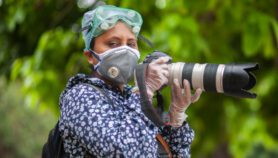Send to a friend
The details you provide on this page will not be used to send unsolicited email, and will not be sold to a 3rd party. See privacy policy.
The media can help in the global fight against disease, both as a watchdog for poor practices, and a champion for successful research.
Next week (17–19 November), the Global Ministerial Forum on Research for Health, meeting in Bamako, Mali, will bring together politicians, government officials, scientists and policy advisors from around the world to discuss how better to combat disease, particularly within developing nations.
Significant progress has been made in recent years by, for example, using bednets to control malaria, or antiretrovirals for HIV/AIDS. Yet many of the challenges remain as daunting as they were in Mexico City four years ago, at the last ministerial meeting — particularly in the face of new epidemics and climate change.
The good news is that research funding for the major diseases affecting the developing world is increasing rapidly, thanks partly to organisations such as the Bill and Melinda Gates Foundation, as well as increased interest from international aid agencies and pharmaceutical companies.
According to a report by the US-based Kaiser Foundation, funding from donor agencies for medical research in low- and middle-income countries increased from US$30 million in 2001 to US$560 million in 2006. This goes some way to addressing the well-publicised statistic that 90 per cent of the world’s spending on medical research focuses on ten per cent of its population’s needs. This charge was made at the beginning of the decade by the Global Forum on Health Research — one of the Bamako meeting’s main organisers.
Crucial communications
But, as many of the papers for next week’s meeting make clear, higher spending on research is only the first step. A more challenging task is to ensure that medical research is targeted where it is most needed, and that results are put to effective use.
In this, the mass media has an important role to play. It can open up the channels of communication between researchers, policymakers and the general public.
Providing accurate information about new research, for example on successful trials of novel vaccines or treatments, is especially important. Such reporting highlights results for policymakers (and indeed for relevant patients) and is a valuable endorsement for investment in medical research.
Where a developing country has carried out the work, reporting positive outcomes can also strengthen demands for further capacity building — a key element for future successes.
Watchdog role
But the media’s role in promoting better health isn’t purely public relations. Engaging the public in debates about designing and delivering health systems is just as important.
The media has always taken pride in its watchdog role, be it exposing fraudulent medical practices such as untested HIV/AIDS treatments, ensuring proper conduct in clinical trials, or highlighting poor healthcare facilities and how intellectual property laws can block access to affordable treatments.
This role will be as crucial as ever as health systems grow in social importance.
More challenging, but equally valuable, is journalists’ role in scrutinising why governments and international agencies fail to get relevant research carried out and findings put into practice.
The reasons may vary, ranging from blinkered priority setting (with inadequate attention on the less ‘glamorous’ chronic diseases), to a lack of coordination between those responsible for healthcare, or even sheer incompetence.
Whatever the reasons, the more the media flags up underperformance, the greater the public pressure on politicians to put things right.
Understanding both sides
To be effective, journalists will need professional training — not just in basic journalism, but also in the specific skills needed to report accurately about health research.
These include, for example, understanding the peer review process (which is essential in appreciating why some treatments are considered more effective than others), and knowing about informed consent procedures in clinical trials.
Biomedical researchers must also recognise that properly trained journalists can help them get research into practice.
Many are wary of the press, often because of bad personal experience. But the solution is not to retreat further into academic ivory towers, or even to talk to policymakers away from the public eye.
Rather, it is to seek ways of building an open communications culture, where the public is fully engaged in healthcare debates. Total transparency is essential when applying research to health. And the media can help provide just that.
David Dickson
Director, SciDev.Net













